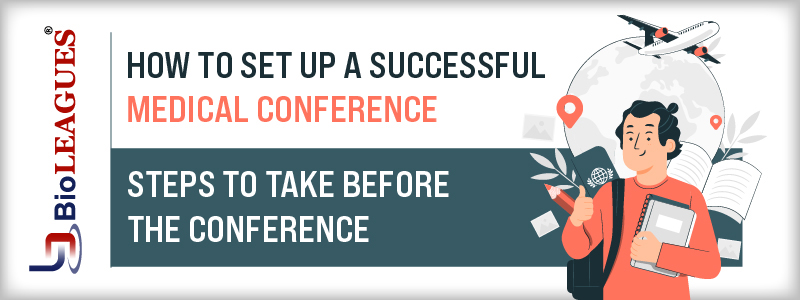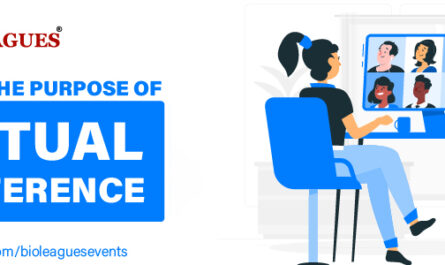Organizing a medical conference is an extremely difficult task. From the outside, it’s easy to underestimate the amount of work needed to assemble even a short program. Indeed, the better things go, the more work has undoubtedly been invested. Human nature is such that potential organizers never believe it until they’re able to experience it for themselves.
The first and most significant step is to talk to previous organizers and take careful note of
what they have to say. They may advise you to reconsider the offer to host the meeting,
but it will probably be too late. Think about every aspect of the conference in turn.
Steps To Take Before The Conference
- Concept Generation
- Every event starts with a concept.
- This is the phase where an idea is generated from a leader realizing the need for an international conference on the issue relevant to health, science, and technology.
- The leader conceptualizes the concept of the conference, including the theme of the topic, and the participants, whether organizing nationally or internationally, mapping the needs of the target audience in that particular area. It also determines the goals to reach.
- Conference Structure
- Lectures vary widely in length, size, and style.
- Plan the meeting structure depending on exactly what you want to achieve. Ideally, you should look to combine education and exposure to novel ideas with entertainment.
- Audience interest will be more easily maintained if there is variety in content and presentation.
- This may involve mixing guest lectures, free papers, posters, and interactive sessions (e.g., small group seminars).
- There will often be a precedent to follow, where a pre-determined conference structure is expected by everyone, which makes it relatively rigid.
- Creation Of The Conference Committee
- The organizing committee and the scientific committee must be established to implement the concept of the event at least one year before the date of the conference, depending on the size of the conference.
- It should involve various internal and external actors associated with the theme of the conference.
- The committee should involve not only relevant clinicians but also a diverse group of people such as –
- public health officers,
- biostatisticians,
- epidemiologists,
- researchers,
- event managers, etc.,
as needed, who can, directly and indirectly, contribute to the success of the conference.
- The organizing committee should be divided into various sub-committees, and people should be assigned to each committee identifying their expertise to ensure the proper accomplishment of the assigned tasks.
- A typical organizing committee includes –
- the President,
- Scientific Committee Chair,
- Secretary,
- Program Coordinator,
- Scientific Committee,
- Advisory Board,
- IT Committee,
- Finance Committee,
- Host Committee,
- Registration & The Cultural Program Committee (optional).
- A typical organizing committee includes –
- The abstract, as well as the scientific program, must be directed by a scientific committee.
- There should be a chair and a secretary who will guide and lead all sub-committees.
- Responsibility for various aspects, including –
- venue,
- accommodation,
- hospitality,
- the abstract and scientific program,
- audio/video,
- logistics,
- promotion/marketing,
- transportation,
- delegate kit,
- finance and fundraising,
- exhibits and food,
will be assigned to the various sub-committees with timelines and processes for periodic committee updates.
- Selection Of Keynote Speakers
- Keynote speakers are an integral component of the conference, and choosing speakers for the conference is one of the most difficult tasks.
- After confirmation of the number of speakers required by the organizing committee, the list of possible speakers should be prepared by seeking common speakers from similar conferences held in the past as well as seeking people who have a keen interest and published works on the theme of the conference.
- The availability of speakers from the prepared list should then be established by proper communication with them early on to clarify the purpose of the upcoming conference.
- The organizing committee should assume that some of the initial speaker lists cannot attend due to preoccupied commitments.
- Speakers who have agreed to attend should be asked to provide their detailed profile and the topic of their presentation to disseminate and attract the target audience.
- The accommodation and transportation of the speakers should be taken into account according to the budget estimate and in a mutual understanding.
- Online presentations should also be planned for speakers who cannot be physically present at the conference but who nevertheless share their ideas.
- Periodic Meeting
- Pre-conference meetings should be held periodically atleast one or two times per month, to gather ideas and move forward with a structured plan and schedule.
- These meetings should be organized with the participation of experts with the provision of incentives.
- These meetings should accomplish the following objectives –
- getting updates on the work and schedule of the sub-committee;
- brainstorming and generation of collective ideas
- gaining clarity on the theme as well as vision of the conference;
- formulating strategies to gather the expected number of audience and presenters;
- discussing and gaining clarification on the financial aspect and the preparation of the budget;
- recognizing the contribution of individuals and sub-committees.
- Minutes of each meeting should be prepared and shared with all committee members and relevant stakeholders maintaining appropriate and ongoing communication.
- Date, Venue & Accommodation
- In order to make sure the success of the event, an appropriate date should be chosen that offers delegates and speakers the greatest opportunity to participate.
- The date should not overlap national functions and events such as other conferences.
- The venue should be decided based on the number of delegates needed to make the conference viable and should consider a central location, adequate space available for the scientific program, parking, IT support, in-house catering services, and reasonable facilities.
- House accommodations and the venue must be pre-booked at least three to six months before the conference with prior consideration of cancellation policies by obtaining written confirmation of cost and services from the venue manager.
- Financial Counterpart
- Expenses for the conference should be identified and forecasted from the conceptualization of the conference in order to set the appropriate fee for attending the conference.
- Expenses are calculated based on the venue, accommodation, transportation, science program, food/beverages, social event, government taxes, etc.
- Revenue should be identified based on sponsorship, funding agencies, and entry fees.
- Funding agencies and sponsors will be notified after the budget is finalized to allow them time to approve the requested amount.
- Relevant government authorities should be made aware of funding proposals from the pre-design phase of the conference for timely government budget allocation.
- A distinct bank account should be opened for the conference event for delegates to pay attendance fees, sponsors to contribute funds, and to maintain transparency before and throughout the event, as well as to facilitate financial audits after the conference.
- Marketing & Registration Consideration
- A website, as well as a social media event, will be created to disseminate information about the conference to the target audience.
- The website must contain information as well as images related to –
- the theme of the conference,
- the rationale for organizing the conference,
- the list of the organizing committee and its contact number,
- its address,
- a registration form online with an abstract submission option,
- online payment option if possible,
- keynote speakers available,
- images of the venue, and
- nearby places of tourist interest.
- New information should be updated regularly.
- Conference brochures should be prepared with all the information mentioned above for contacting funding agencies, attracting potential attendees as well as disseminating information about the program to those concerned.
- There should be a provision of a continuing education credit points certificate that will endorse participants and aid in career success.
- Fees and registration deadlines (early registration and final registration date) must be taken into consideration and will be available in form on the conference website as well as at the organizer’s office.
- Delegates will be assigned different payment terms as they see fit.
- Registration must close at least fifteen days before the conference, assuming that a limited number of delegates arrive for on-site registration.
- This will help plan registration kits, logistics, and food and beverages.
- An immediate acknowledgment of receipt of registration must be made to guarantee the delegate the place reserved.
- Confirmation of registration will be made upon receipt of payment.
- A group of individuals from the registration sub-committee should plan the registration and distribution of kits/badges for the upcoming conference in 2025, minimizing crowds and smoothing the flow of delegates.
- A simple attendee database system can be provided, which includes all information regarding particular delegates.
- Review Of The Scientific Program
- Abstracts for both the poster as well as oral presentations will be called via website and brochures as soon as registration opens.
- Abstract and presentation details, including topic area, presentation time, presentation format, submission deadlines, and abstract submission process, should be incorporated into websites and pamphlets.
- The abstract of the presentation should be prepared in the desired format and should be sent to the official conference email.
- After the review and finalization of abstracts and speakers by the scientific committee, the book of abstracts should be prepared, including a message from the chair, the relevant government authority, and the chair of the scientific committee, details of the committee of the organization, as well as sponsor announcements.
- The program must be prepared and include the title of the presentations, the names of the speakers, the chair and the co-chairs of the session, the time limit for each presentation as well as the –
- inauguration,
- cultural program,
- lunch and dinner times.
- The inauguration should be planned to invite a relevant high-level government dignitary or someone who has worked extensively in the area of the conference theme.
A Week Before The Conference
- Checklists
- A final pre-conference meeting should be organized to ensure final preparation.
- A checklist should be prepared to ensure that different aspects are missing or completed.
- Organizers should ensure that all speakers and chairpersons are fully prepared.
- Some speakers may cancel due to unavoidable circumstances.
- The organizing committee must ensure that the regional speaker is a substitute.
- The venue and the audio-video equipment/setup must be reassessed and confirmed in order to avoid an obstacle.
- Delegate kits should be prepared a week in advance, along with additional kits for on-site registration.
- Media representatives should be briefed to attend and cover the conference portion.
- Conference material, signs, and other necessary items should be prepared earlier and should be ready.
- An informal pre-conference meeting should be organized a day before the conference to allow the speakers and the organizing committee to get to know each other better and to plan accordingly for the following day.
- Freebies
- Free communication sessions are often considered the most interesting and dynamic part of the conference.
- Decide if you want to restrict free items to particular topics and ensure that clear in the call for abstracts.
- Optimize your choice of presentations by sending atleast two calls for abstracts as widely as possible, leaving the closing date as late as possible.
- Request structured abstracts with a limited length (usually three hundred words) divided into –
- the title,
- authors with the name(s) of the presenter(s) underlined, institution,
- objective,
- methods,
- results and conclusions.
- This is particularly crucial if the abstracts are to be published in a journal.
- If you intend on allowing posters to be displayed, use the same abstract form, but ensure there is a large clear box for potential presenters to tick to demonstrate their preference for an oral or poster presentation.
- Assemble a small team to rate each abstract and decide which ones are worth featuring.
- Ensure that judges do not know the perpetrators and institutions involved.
- Sometimes there won’t be enough materials to complete the proposed program.
- In this scenario, do not be tempted to compromise on quality – it is better to reduce the duration of the program than to fill it with material of questionable merit.
- Likewise, don’t be tempted to help fill the program with one of your own papers, as cries of nepotism will undoubtedly follow.
- Send Out Notifications
- Notify those selected to present as soon as possible, clearly indicating how long they will have (for example, twelve minutes maximum, then three minutes for questions).
- Ask them to write to confirm exactly what medium they need (one or two slide presentations, video, overhead, etc.).
- If there is to be a prize for the best free article, assemble your jury panel well in advance.
- Also, don’t forget to get the prize and identify a suitable time for it to be delivered.
- Sending out notifications about the upcoming medical conference, even to those who only expressed their interest before, could also help garner some last-minute registrations.
- Breakout SessionsDiscussion groups, tutorials, seminars andhands-on sessions,
can add much-needed material variety, especially at the end of a long day.
- However, it is often quite difficult to predict exactly how these sessions will unfold.
- Previous experience indicates that success largely depends on the charisma of the person leading the group, so choose wisely.
- Sometimes a lively group discussion is aided by an informal setting, such as the bar, where otherwise reserved individuals will feel comfortable participating and chatting vehemently.
- Posters
- Provided the venue has adequate space and display panels, the decision of whether or not to include poster presentations at your conference is a personal decision.
- Certainly, a good collection of colorful posters adds an extra dimension to the conference room.
- On the other hand, poor presentations of poor quality research have the opposite effect.
- Unfortunately, once you have accepted a summary, you have no control over what is displayed.
- However, it should be remembered that presenting a poster may be the only way for an intern to obtain study leave to attend the meeting.
- So, by offering poster presentations, you may be encouraging the researchers of tomorrow.
- If you accept posters, check the size and type (e.g., Velcro) of poster boards that are used locally.
- Specify the exact size limit to those presenting (eg maximum width = 100cm; maximum height = 75cm) and purchase appropriate fasteners.
- Velcro panels are the most common type used today.
- Since many posters are sold in multiple pieces, take this into account when deciding how many Velcro “dots” to purchase.
- It is traditional to judge the posters and award a prize to the best.
- Find an appropriate person to judge is usually quite easy, especially if a little prompting is free.
- The practice of combining poster presentations with short oral presentations, lasting one or two minutes each, has recently become widespread.
- Apart from providing great entertainment, this gadget adds little to the science of the meeting and can be a bit demeaning.
On The Day Of The Conference
- Organizing Committee members should arrive at the venue early and ensure all setup is done as planned, including registration desk, venue hall, catering, banners and posters, assignments volunteers, audio-video, and computer resources.
- Make sure there should be good hospitality at the entrance to welcome speakers and delegates.
- The registration desk should be organized in such a way that there should be a limited crowd for registration at each desk by allocating plenty of volunteers.
- The scientific session should be started in good time with a welcome note addressing the theme of the conference along with also all keynote speakers and delegates.
- Each speaker’s time limit should be announced after the welcome note to remind them earlier with a possibility of alarm silence during the conference.
- There should be a prearranged seating arrangement for keynote speakers, speakers, guests, media personalities, and delegates.
- A responsible person from the scientific committee must be ready to make a quick decision whenever necessary during the conference.
- Adequate space should be allocated for the poster presentation session by ensuring an adequate amount of poster boards with a pre-informed size and should be pasted at the start of the conference.
- The inauguration program should be conducted by inviting a government authority related to the theme of the conference, such as the minister of health, secretary of health, or some experts with deep knowledge of the theme of the conference can help ensure that the authority commits on behalf of the organizing committee to the improvement of the chosen theme in the future.
- Grassroots politicians can be avoided when it comes to inviting dignitaries to inaugurate the conference.
- Some associated experts will be invited to speak on burning issues, challenges, and the way forward for the conference.
- A brief statement can be signed by the organizing committee, experts, and government authority to commit to innovation and improvement in the future.
- Activities like lunch, dinner, afternoon tea, and a cultural program should have an appropriate number of volunteers to relieve the delegates.
- At the end of the conference, we should have some time to thank the sponsor speakers who have been major contributors to the medical conference by providing certificates and tokens of love.
- A press conference must be organized at the end to summarize the conference, its results, and its projects in the presence of the keynote speakers and the organizing committee.
- The organizing committee must be on site until late hours to conclude the program, the necessary items, and the equipment in an appropriate manner.
- All speakers should be given appropriate hospitality until they leave the conference.
- Despite careful planning, problems during the conference are inevitable.
- They must be treated continuously throughout the day.
- Many of the challenges that arise are predictable and have simple solutions.
- Dealing With Criticism
- An international medical conference is an important part of any organization when it comes to meeting their learning, networking, research publication, and marketing goals.
- They are not organized frequently, and some organizations may organize the conference for the first time.
- Criticism is an inevitable component of any type of event.
- Although the review is generally negative, it’s a great opportunity to learn from mistakes and improve in the same events to come.
- Constructive criticism should always be accompanied by appropriate suggestions.
- Some unjustifiable fake reviews should generally be ignored.
- Most of the time, a smiling face toward the critic generally helps to relax and spread positive vibes and can help psychologically.
After The Conference
- One of the most important parts of post-conference is thanking all the speakers and written sponsors who helped in making the conference happen.
- Feedback provided by delegates during the conference should be analyzed to develop an analysis of the strengths and weaknesses of the conference.
- Any reporting that has been committed during the conference must have started within a month of the conference by recruiting a reporting team that includes experts from various fields.
- A detailed impact report on the events of the conference can be generated by posting the details of the conference, uploading the photos, and providing the final version report back to the audience with the plan for the next conference, if possible.
- The financial audit should be done in time before report generation with detailed financial tracking of sponsors, especially government funding agencies.
- Regardless of its success, the conference is not over until all follow-up tasks have been completed.
Successful Medical Conferences Are Carefully Planned & Well Executed Conferences
Medical events and conferences are central to every medical professional life, as they provide an invaluable opportunity for –
- learning,
- networking, and
- exploring new ideas.
No matter the size of the conference, it must be well organized successfully. A successful conference relies on advanced planning, delegation, follow-up, and the organizers’ dedication to the event. The well-organized conference not only enriches the experiences of the organizer but also creates a good impression and publicity on the scientific community and motivates them to expand their ideas and knowledge in the future. To know more about how you can promote and make your upcoming medical conference 2025 a roaring success, get in touch with us today.




